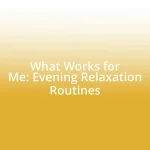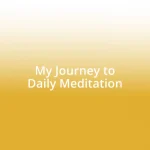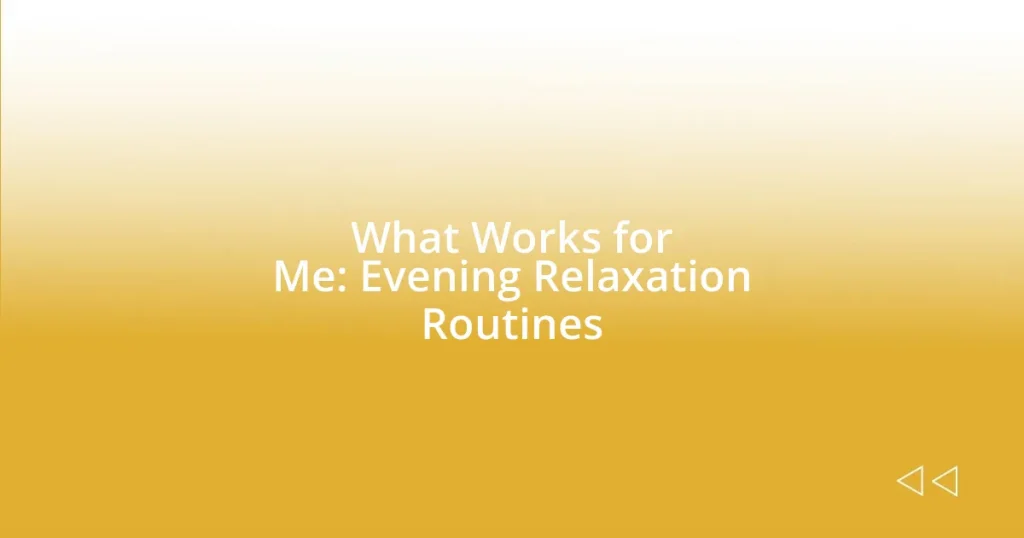Key takeaways:
- Evening relaxation is essential for winding down, promoting mental clarity, and preparing for restful sleep.
- Establishing a consistent routine signals to the brain that it’s time to relax, enhancing the overall relaxation experience.
- Key components for effective relaxation include creating a soothing environment with proper lighting, sound, comfort, and aromatic elements.
- Mindfulness practices like body scan meditation, gentle movement, and mindful eating help ground individuals in the present, fostering deeper relaxation.
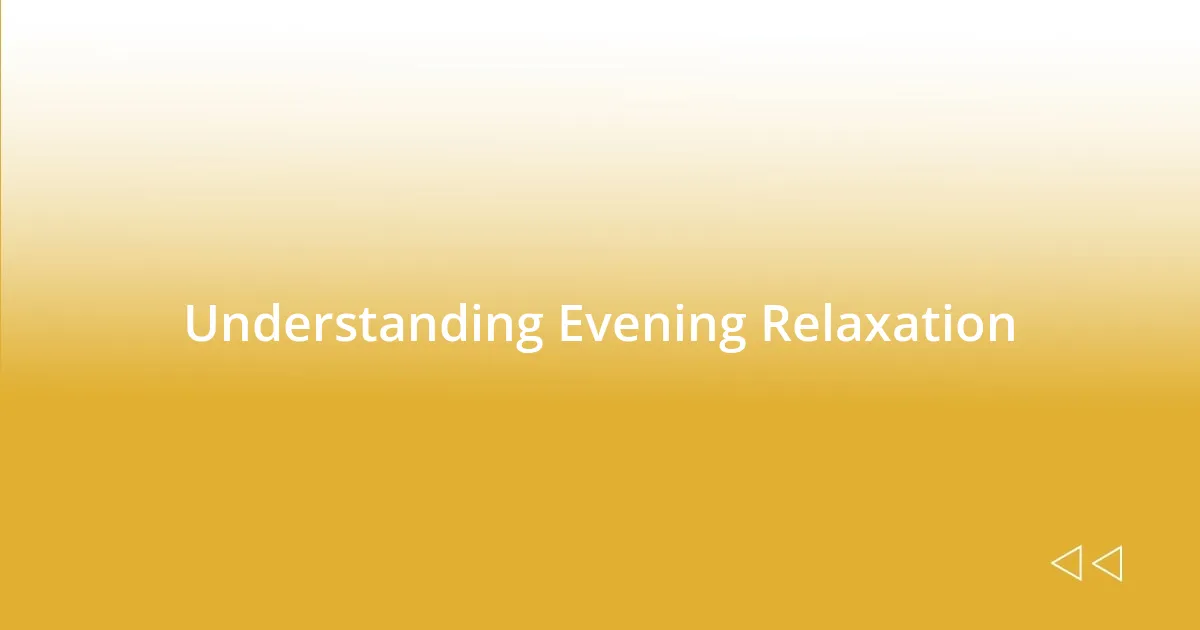
Understanding Evening Relaxation
Evening relaxation is more than just a set of activities; it’s a crucial process for winding down after a busy day. I often find myself reflecting on the day’s events and acknowledging emotions that I might have brushed aside during the hustle. Have you ever noticed how valuable that time can be for clarity and peace?
For me, creating an inviting atmosphere is key. I dim the lights, light a candle, or curl up with a cozy blanket. The moment I do this, I can feel my body responding and shedding the stress of the day. It’s almost like my environment embraces me, letting me embrace my thoughts without distractions.
Picture this: you’re sinking into a soft chair, inhaling a soothing aroma from a calming essential oil. How do you think that would impact your level of relaxation? I’ve experienced that the simple act of pausing – connecting with my breath and letting go of the day – can transform my mindset, preparing me for a restful night ahead. This kind of awareness is truly nourishing for the soul.
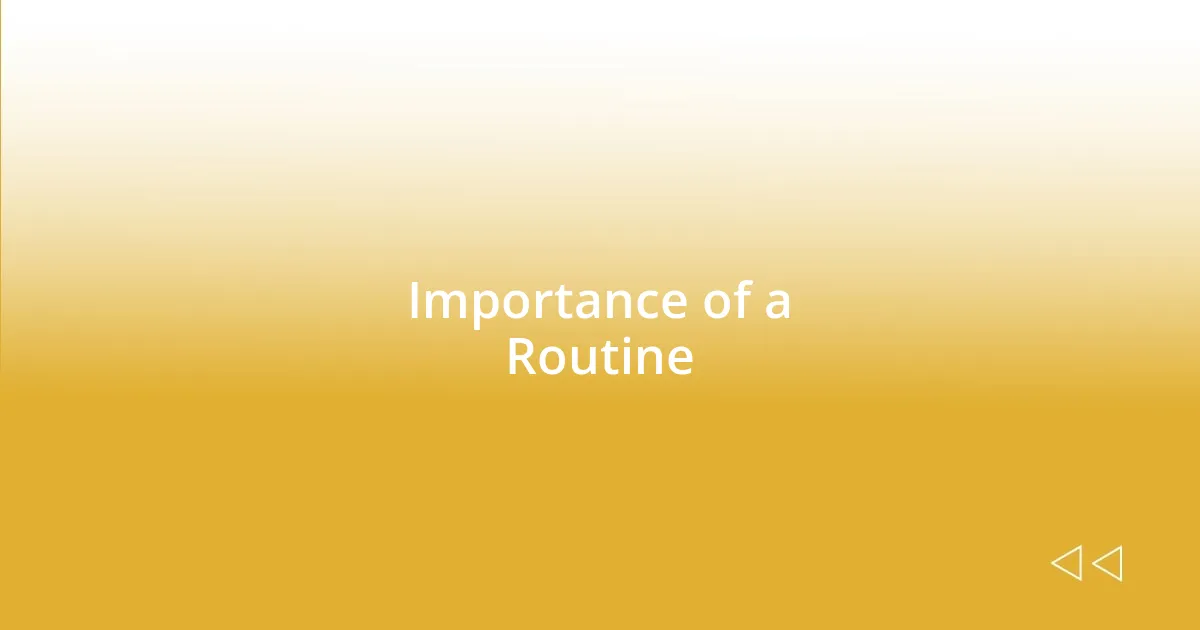
Importance of a Routine
Routines play a pivotal role in setting the tone for our evenings. When I stick to a regular pattern, I find that it helps signal to my brain that it’s time to relax. This clear boundary between the busyness of the day and the tranquility of the evening fosters a sense of security, which is essential for winding down.
Moreover, I’ve noticed that having specific activities I engage in each night creates a comforting predictability. It’s almost like a gentle lullaby for my mind. After a long day, knowing that I’ll unwind with a favorite book or soothing music brings me a sense of relief. These little rituals remind me that it’s okay to let go and embrace the quiet moments.
Additionally, routines can significantly enhance sleep quality. For example, when I incorporate a short meditation or deep-breathing exercise into my evening, I feel my tension slip away. Isn’t it fascinating how such small changes can lead to improved rest and energy levels the following day? I truly believe that these mindful moments contribute to a more balanced life.
| Benefits | Examples |
|---|---|
| Enhanced Relaxation | Engaging in calming activities like reading or meditating |
| Consistency | Maintaining a predictable routine helps signal the end of the day |
| Improved Sleep Quality | Including mindfulness practices before bedtime |
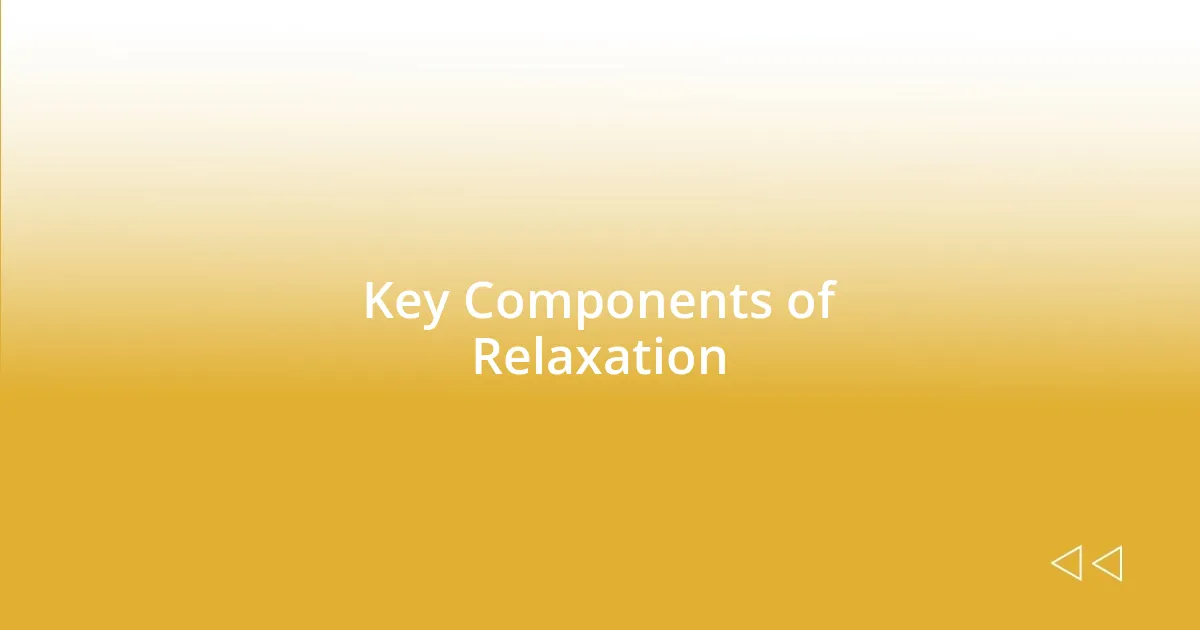
Key Components of Relaxation
When I think about the key components of relaxation, two things immediately come to mind: mindset and environment. It’s fascinating how my mental state can significantly sway my ability to unwind. For instance, I often catch myself letting go of the day’s stress by consciously deciding to focus on gratitude. This shift in mentality fosters a sense of calm, allowing me to enjoy the little things, like the gentle sounds of nature outside or the warmth of my tea. The right mindset creates a ripple effect that prepares me for a more peaceful evening.
As for the environment, it truly sets the stage for relaxation. I believe that the sensory experience can either soothe or stimulate us. Here are a few components I find essential:
- Lighting: I consistently opt for soft, warm lights or candles, as they immediately evoke a sense of coziness.
- Sound: I’ve discovered that calming music or even nature sounds can transport me to a serene place, making it easier to detach from the day.
- Aromatherapy: Utilizing essential oils like lavender helps me unwind and creates a tranquil atmosphere that wraps around me like a warm hug.
- Comfort: I always ensure my space feels physically comfortable—whether that means adjusting the temperature or having a favorite blanket nearby.
These elements come together beautifully, creating a supportive refuge that encourages relaxation and reflection.
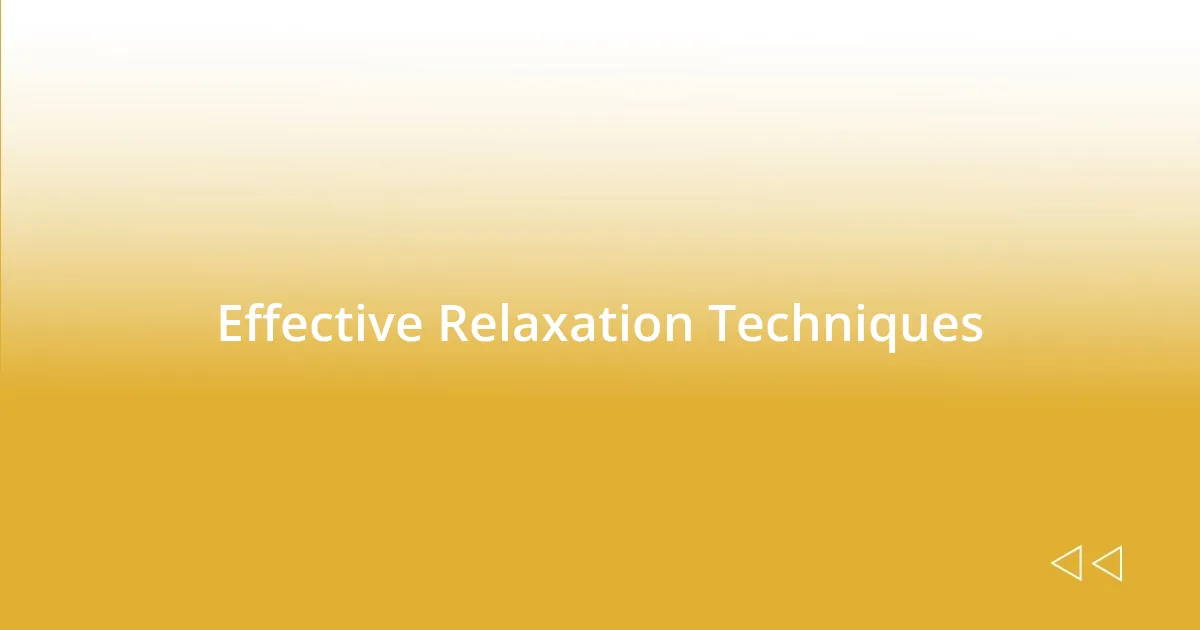
Effective Relaxation Techniques
When I think of effective relaxation techniques, one that stands out is progressive muscle relaxation. This practice involves tensing and then slowly releasing different muscle groups, which helps release physical tension built up throughout the day. I can’t tell you how much lighter I feel after just a few minutes of this technique; it’s like giving my body permission to let go of the stress I didn’t even realize I was holding.
Breathing techniques have also become a cornerstone of my evening routine. One method I enjoy is the 4-7-8 technique, where I inhale for four seconds, hold my breath for seven, and exhale for eight. I often find myself imagining the day’s worries drifting away with every exhale. It may sound simple, but this practice has a profound effect on my mental clarity and relaxation. Have you ever experienced that refreshing moment when you finally take a deep breath after a hectic day? It’s remarkable how something so basic can transform your state of mind.
Another technique that resonates with me is guided visualization. I often set aside a few minutes to picture myself in a peaceful place, like a quiet beach or a shady forest, while listening to a calming recording. It’s amazing how vividly I can recreate those sensations in my mind. The scents, sounds, and feelings take me somewhere far removed from my daily stressors. Have you ever felt transported by your imagination? It’s a powerful tool for unwinding, and I believe it’s a wonderful way to prepare for restful sleep.
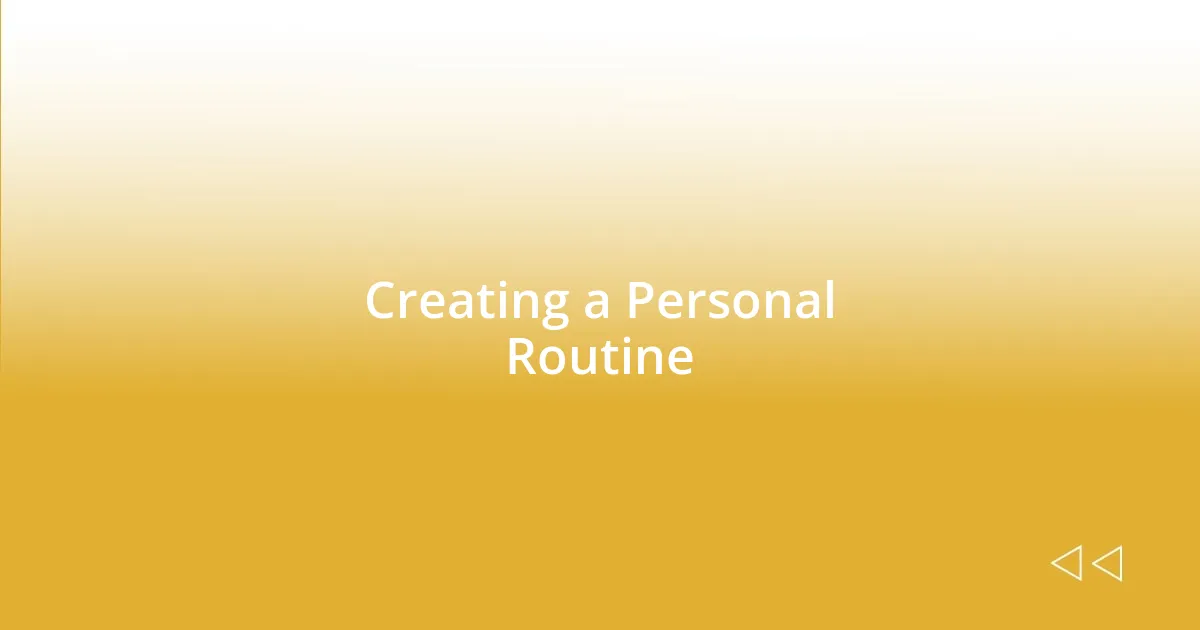
Creating a Personal Routine
Creating a personal relaxation routine is all about finding what resonates with you. For me, I started by experimenting with different activities—like journaling, reading, or even just sipping tea. It was eye-opening to realize how some evenings were transformed by just the simple act of writing down my thoughts, allowing the day’s chaos to flow onto the page and fade away. Have you ever noticed how putting pen to paper feels like a release? I find that it instantly clears my mind.
Additionally, I prioritize consistency in my routine. Psychologically, our brains love patterns, so I’ve integrated the same wind-down activities every night. For instance, I turn off my electronic devices at the same time, which helps signal to my mind that it’s time to relax. This shift has made a noticeable impact; I feel less inclined to dwell on work emails and more focused on my personal peace. It’s a small tweak, but have you ever tried unplugging for an hour? The difference can be stunning.
I’ve also learned that reflecting on what truly grounds me can enhance my routine. Sometimes, I ask myself, “What genuinely makes me feel at ease?” For me, it’s those quiet moments spent with a warm, cozy blanket and my favorite novel. Depending on the day, my preferences might shift, but revisiting the comfort of that ritual keeps me centered. What about you—do you have those rituals that bring that sense of home? Embracing your unique routine creates a personalized sanctuary that invites relaxation after a long day.
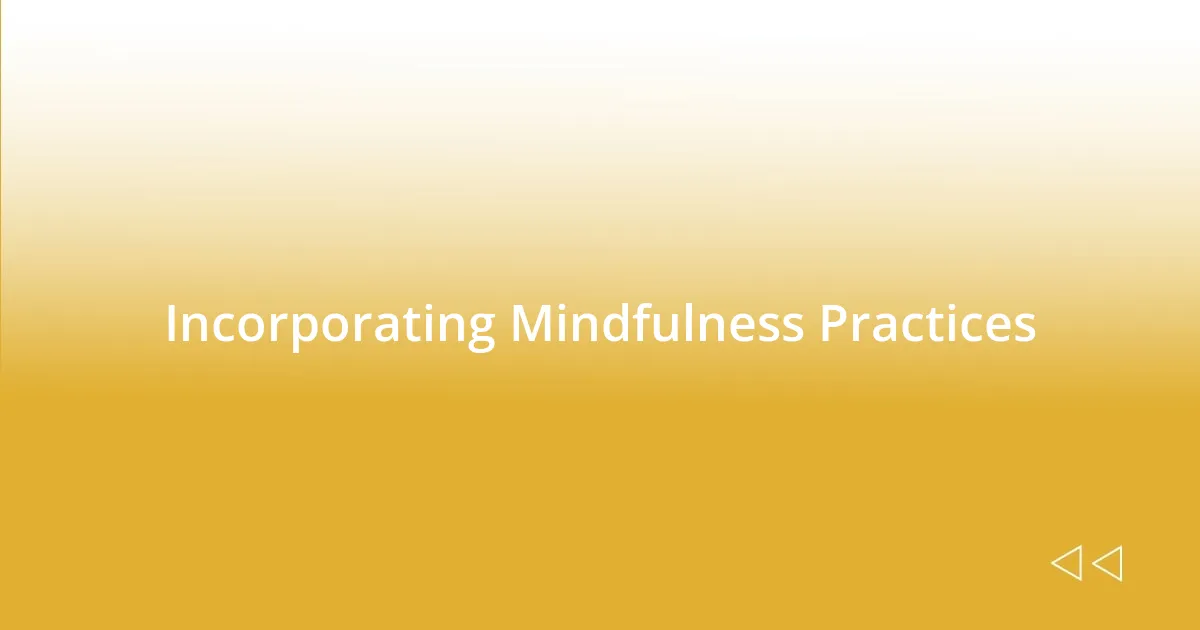
Incorporating Mindfulness Practices
Mindfulness practices have an incredible way of grounding me in the present moment. One technique that I’ve found beneficial is the body scan meditation. As I lie comfortably, I guide my awareness through each part of my body, noticing any tension or discomfort without judgment. It’s as if I send a wave of relaxation through me, witnessing every sensation. Have you ever taken the time to really listen to your body? That practice connects me deeply to my physical self, often revealing areas where I hold stress.
Another powerful practice is mindful movement, like yoga or tai chi. At the end of a busy day, I often roll out my mat and flow through gentle poses, focusing on each movement and my breath. It feels like the day’s worries melt away with each transition. When I concentrate on how my body feels in each pose, I find clarity and calmness enveloping me. Have you ever experienced how movement can embody mindfulness? It’s a beautiful reminder to be present, and I often emerge feeling rejuvenated, almost as if I’ve been reset.
Lastly, incorporating mindful eating during my evening routine has transformed how I end my days. Whether it’s savoring a warm cup of herbal tea or a light snack, I take moments to truly appreciate the taste, texture, and aroma of my food. Instead of rushing through a meal or while binge-watching my favorite show, I make it a ritual to pause and engage with each bite. How often do we forget to really taste our food? This mindful approach not only enhances my relaxation but also helps me cultivate gratitude for simple pleasures. Each sip feels like a moment of self-care, reminding me to slow down and tune in.
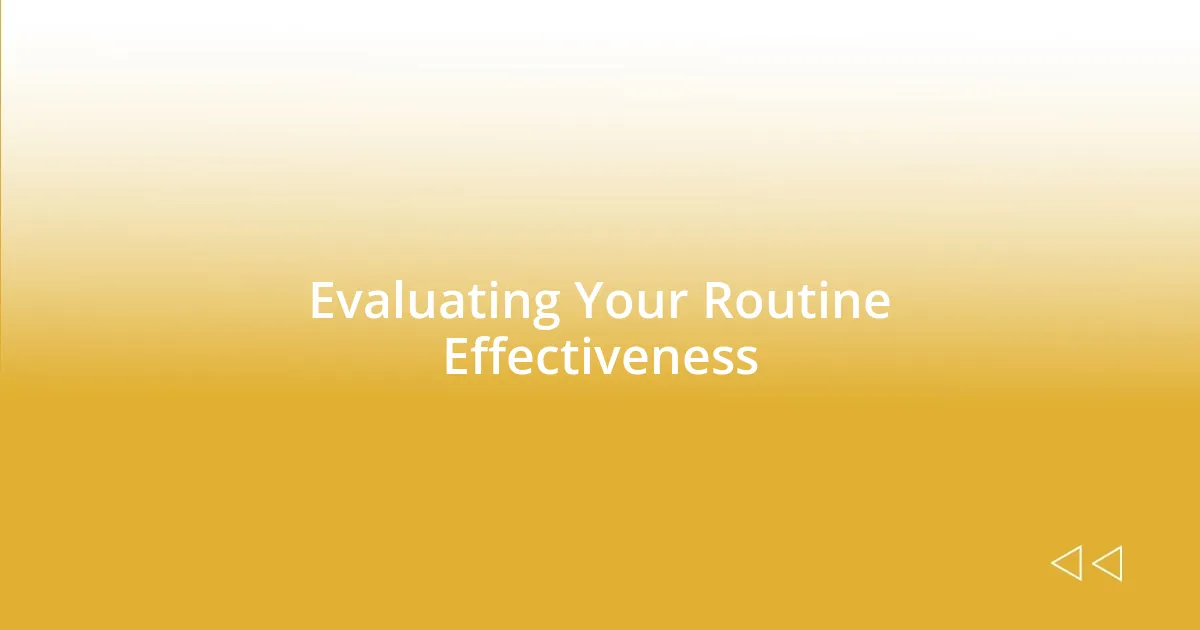
Evaluating Your Routine Effectiveness
Evaluating the effectiveness of your evening relaxation routine is crucial to understanding its impact on your well-being. I often jot down my feelings after implementing changes. This simple act of reflection helps me gauge what’s truly working. If I notice I’m tossing and turning after a week of trying new relaxation techniques, it’s a signal that something needs to shift. Have you ever felt that tension creeping back in despite your best efforts? Tracking your feelings can help you identify patterns.
I also find that sharing insights with friends can provide new perspectives. For instance, I once discussed my struggles with a friend who suggested adjusting my evening reading time. By simply switching from suspenseful novels to serene poetry, I found a significant decrease in my evening restlessness. Sometimes, having an external point of view reveals what you might miss. Have you tried talking to someone about your routine? It could offer valuable feedback and spark different ideas.
After evaluating my routine, I always ask myself how I felt during those moments. Did sipping my tea while watching the sunset bring me peace, or was I distracted by daily stress? I’ve discovered that if I’m more engaged in my rituals, I experience deeper relaxation. This clarity not only guides my future choices but also cultivates a greater appreciation for the activities that consistently bring me joy. What parts of your routine leave you feeling invigorated, and which ones might need a little fine-tuning?
